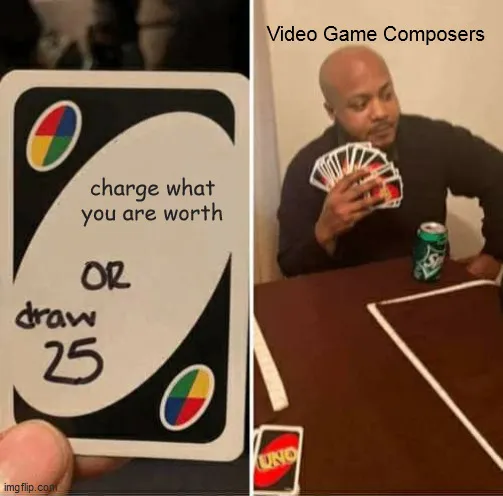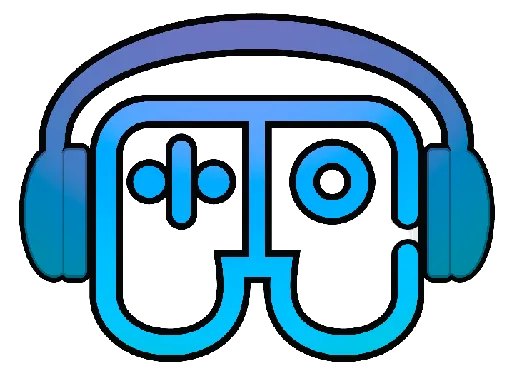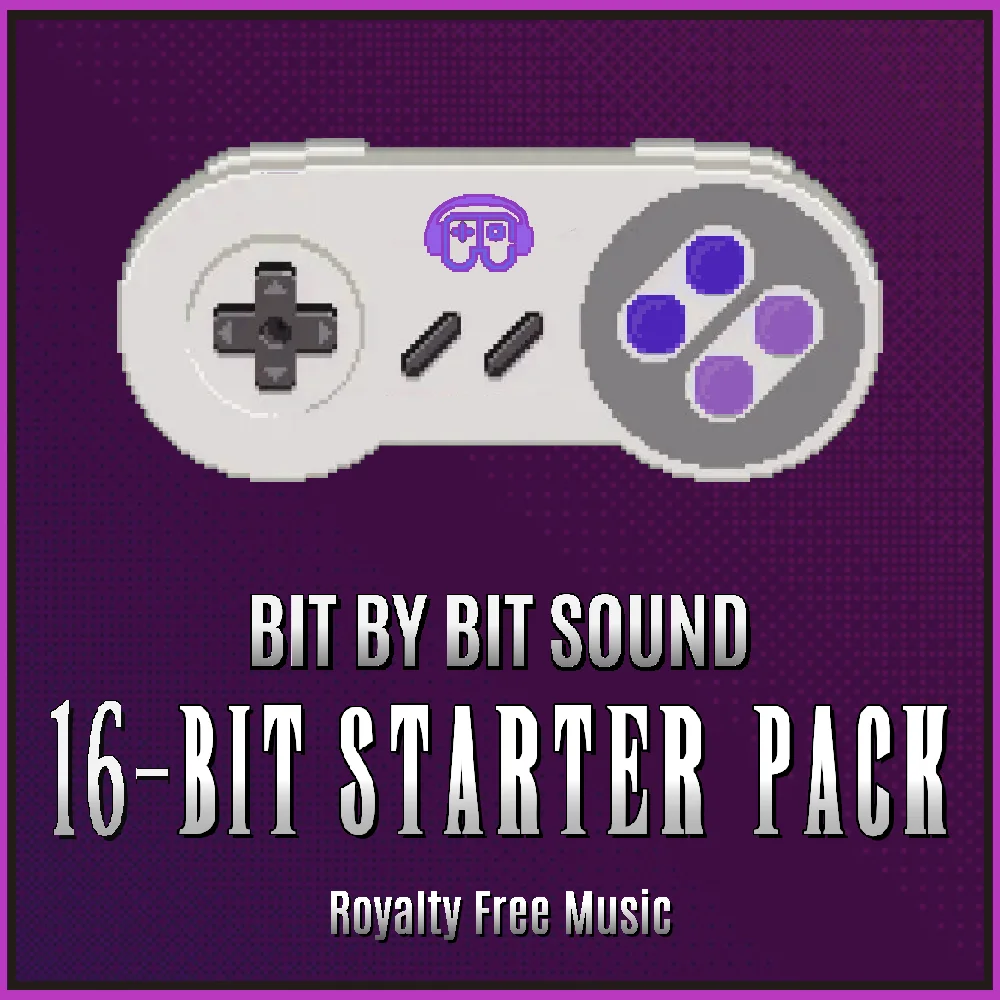Blog Articles
Search Bit By Bit Sound

Indie Game Music Composer: Cost of Custom vs. Stock Music
Indie Game Music Composer: Cost of Custom vs. Stock Music
Indie Game Music: Custom Stock Music or Royalty Free Music?
There comes a point in every indie games development where developers have to make a choice: do I use royalty free stock music, or do I hire an indie game composer? Depending on the game and a developers budget, this can either be a no brainer or an agonizing decision.
As an indie game composer (learn a bit more about me here!), I’d like to guide you through the layers of nuance that determine the costs of custom music as well as royalty free stock music. Let’s explore what to expect when you are faced with this choice.

What are indie game composers rates?
When it comes to composers, it can be hard to nail down an average rate. Many indie game composers I know charge drastically different rates. This can stem from many things, such as experience level, personal cost of living, and even self esteem.

An Indie Game Composer in a nutshell
The video game industry can be a strange place, where composers, artists and developers alike will pour years of their life into their craft, and then hesitate when they have to put a price tag on their work. I’ve seen many people get nervous at the idea of charging as little as $5 for HOURS of content that they are providing. As creatives, we tend to undervalue our work.
That being said, the general range I’ve seen many indie game composers work within is $200 to $1200 per minute of completed music. That’s quite a wide spectrum for developers to wade through. For young indie developers, this often results in a bit of sticker shock, but there is a reason professional indie game composers can command this kind of coin.

The first time Pikachu asked a composer what their rates were…
Keep this in mind: 1 minute worth of music does not equate to 1 minute worth of work. Composers generally have to spend several hours to craft a solid minute or two of music. The process involves not only writing the music, but mixing and mastering as well (the art of balancing the instruments within a song with each other).
Indie game composers also have to factor in the possibility that this song they spent hours on could be rejected by the developers, or they could be asked to make several small revisions.
A seasoned indie game composer generally has developed a thick enough skin to not take these requests personally. We do however, need to take realistic precautions for these scenarios. This is why many composers will include a number of allotted revisions in contracts. We don’t always nail it on the first try!
Experience Level of an Indie Game Composer

It’s not as simple as just writing music
Another factor in why composers can charge these rates is experience. One does not simply decide “I’m a video game composer now” and begin charging $1200 per minute of music…unless perhaps you are Hans Zimmer. Legends say he can command a whopping $50,000 per minute of music for his film scores, which if true, is just mind boggling.
Like any skill, indie game composers have poured years of their lives into mastering their respective craft. The reason we can deliver solid compositions within several hours is that we have put in the time. For example, check out this mock up I did for the Tails of Iron trailer.
Overall, I probably put about 8 hours into this production. The reason I was able to get it done so quick is because I’ve been writing and producing music for about 16 years now…oh my god I’ve been doing this for 16 years now.
As frightening as the ‘per minute’ model may sound, an experienced composer may actually save you time and money. They do this by writing interesting music that occurs in a shorter loop. Go back and listen to some of the classic OST’s from the 16 bit era (i.e. Mega Man X). You may notice that a lot of the songs occur within a 30 second to 60 second loop.
If you want to use a professional composer, but are on a tight budget, consider asking your composer to keep the loops around 30 seconds. You can essentially cut your costs in half this way (it’s like 2 for the price of 1).
If you are a DIY kind of person, but have no musical experience whatsoever, do yourself and your players a favor, and hire a professional. If you understand the connotations of ‘game dev art,’ consider that ‘game dev music’ is also a thing, albeit not as prevalent.
Skill Set of an Indie Game Composer
Video game music in particular comes with it’s own set of skills as well. As players will often hear a song on loop for an indeterminable amount of time, composers have to find a balance between a catchy melody that will be memorable for years, and not writing something that will gradually wear on the listener or become grating over time.
As implied above, game composers also have to write music that loops seamlessly. There are many approaches composers can take to achieve this, but it’s all a song by song basis, and usually a factor composers have to keep in mind throughout the writing process.
Add in the advancements of game audio that have developed over the past 15 to 20 years, such as vertical layering, horizontal resequencing, and middleware such as FMOD and Wwise, and a composers skill set expands far beyond just writing good tunes.
With all this in mind, it’s no wonder composers can command these type of rates for an original custom soundtrack. Personally, I have my set rates, but I do my best to work within a developers budget. If you are interested in my services, you can contact me here.
But what if you are a solo indie dev without a publisher, and don’t have the means to hire a composer? Well, let’s look at another option: Royalty Free Music.

How much does Royalty Free Music cost?
As indie games generally have a smaller budget to work with, royalty free music is often the ideal choice for many developers. Royalty free music (also known as stock music/production music/library music/copyright free music etc) has become plentiful across many game dev asset stores (you can check out some of mine here). This offers developers a quick and relatively affordable way to get great music into their games.
There are so many options when it comes to stock assets, developers can become overwhelmed at times finding the right song. Depending on how much music you need for your game, there are a couple factors to keep in mind.
Composers will sell their music either as single songs, or in packs of multiple songs. As with custom music, royalty free music costs have a pretty wide range. I’ve seen anywhere from $5 to $500, depending on if you are purchasing a single or a pack, and the level of the composer.
That sounds easy, why doesn’t everyone do this?
One issue developers can run into when using stock music (or assets in general) is consistency. If you purchase a title track from composer A, and a level select track from composer B, and then the level theme is from composer C, there is a good chance you will encounter audio inconsistencies. Specifically with the level, or volume, of the tracks.
Now, since these are stock tracks, you won’t be able to contact your composer and ask them to sort the issue out. A work around for you indies would be grabbing a program like Audacity, importing all 3 tracks into a project together, and balancing the volume that way.

The art of balancing music from multiple sources
If you take this approach, try turning the louder tracks down first, before boosting the volume of the tracks quieter tracks. The reason being is that you don’t want your audio to clip, which can be pretty unpleasant to the ear.
To avoid doing all this, it may be a better idea to pick up a music pack from a indie game composer, as a good composer will have already done this balancing act for you. Look for music packs that have a variety of songs for different applications. In my 8 bit music pack, I include multiple songs that can be used for menus, boss fights, levels, as well as a couple of jingles.
What about Revenue Share Agreements? Don’t some composers work for free?
Ahhh, the revenue share agreement. Some love em, some hate em. I personally have worked on many rev share projects, and while I have reaped some reward from this type of agreement, I’m not exactly ready to rush into another one.
The problem with revenue share agreements from a composer’s perspective, is there is no guarantee that the game will actually be finished. It’s one thing to put a lot of work into a project and have it not perform well upon release. It’s something else completely to put in a lot of time and effort on something that never gets finished.
I have probably worked on around 7 or 8 rev share projects in the past 8 years. You want to know how many of those actually put money in my pocket?
One.
Know how many of these 8 games were actually finished?
One.
Now, you can still find people who will work under rev share agreements. Generally, they are an up and coming indie game composer looking to get their feet wet in the industry, and there is nothing wrong with that. I certainly learned a lot doing this kind of thing.
OK, so when should I hire someone, and when should I get work for free?
It all just depends on where you are at in your game development career. Are you an amateur trying to hone your craft? Are you an intermediate dev with a couple of published titles under your belt, but still haven’t really made waves in the indie game scene? Or are you a seasoned dev, with a publisher backing your next project because of the buzz generated from your last game?
If you are anything but an amateur, I wouldn’t recommend looking for someone to work for free. You get what you pay for, as the old saying goes. Hiring a professional will result in less hand holding along the way, which in turn means more time for you to focus on your craft.
All that being said, I do still offer a form of revenue share agreements. The only difference is that I still ask for a payment up front in addition to a percentage of revenue on the back end.
“But Bert,” I hear you say, “That’s not a revenue share! You’ve deceived me! I’ll never trust again! YOU WERE THE CHOSEN ONE!”
Calm down Obi-Wan. I may ask for a payment up front, but I provide a huge discount to my rates. On top of that, this payment is recoupable for the developers, meaning after the game is completed, I won’t start collecting on the rev share until you make your initial investment back.

A Composer’s reaction to Revenue Share Agreements
I’ve found this model works well for all parties, as I receive compensation for my work up front, and developers get an awesome custom soundtrack for their game at a discounted price.
So How Much Should I Expect to Spend on Video Game Music?
Well, if you’ve read this far, then you know there really isn’t a clear cut answer. There are many factors involved in budgeting out for game audio, and so you really just have to take inventory for yourself. Take an honest look at your game and answer some of these questions:
What are my intentions for this project? (Is this a passion project or am I looking to make a splash in the game industry?)
How many songs do I really need? (Title screen, level select, ‘x’ number of level songs, regular boss music, final boss music, victory and defeat jingles etc.)
How much can I realistically afford to pay for music?
Answer these questions for yourself, and then ask a composer what their rates are. Then all it takes is some simple math and a little planning to figure out what kind of cost you will be looking at.
Example:
Songs Needed (@ 1 Min each) Composer rate = Cost
6 songs $500 = $3000
Remember, you can request how long you want the songs to be to keep things within budget!
(6 Songs @ 30 seconds each)
6 * $250 = $1500
Hopefully this helped you. Now when you start searching for a professional indie game composer for hire, you can do it like a Boss.


Need Stock Music Fast?
Bert Cole
I believe that a great soundtrack is more important that great graphics. That is why I am dedicated to delivering top quality music to developers of all levels. Whether you are looking for royalty free music or need a custom soundtrack for your game, I aim to deliver the audio your game deserves.

